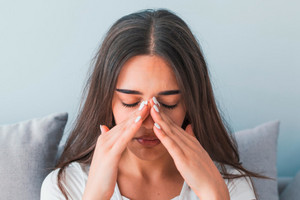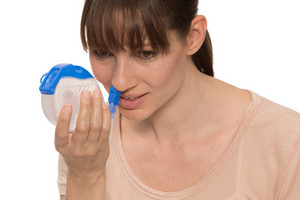Water in your throat, nosebleeds or burning after the nasal douche? These side effects usually only arise if you do not use the nasal rinse properly. We can show you which errors can cause side effects and how to easily avoid them.

Nasal rinses are considered a treatment for diseases affecting the nose and paranasal sinuses that have very few side effects. Side effects are therefore usually due to incorrect handling of the nasal douche or errors while preparing the irrigation solution. Generally speaking, using a nasal douche should not hurt and there should be no side effects. Click here for instructions on how to use the nasal douche properly.
A burning sensation in your nose can occur if you use the nasal douche while the mucous membranes in your nose are irritated. This is often the case if the water used
To avoid a burning sensation in your nose,
Infections can occur after a nasal douche if contaminated water is used to rinse the nose. In Germany, tap water is considered bacteriologically safe. People at greater risk of infection (such as those with a weakened immune system or cystic fibrosis) should use boiled or sterile water for a nasal douche.

Nosebleeds can occur after the nasal douche when dried mucus or crusts are released from the nose.
In some models, the nasal joining piece has to be inserted into the nose. If it is inserted too deep or pressed too hard into the nostril, this can cause small injuries to nasal septum and/or the mucous membrane in the nose. These minor injuries can lead to pain and nosebleeds.
The PARI Montesol nasal douche rules out this risk as the joining piece is not inserted into the nose, but is positioned on rather than in the nostril. It is also made of especially soft plastic.
If you get liquid in your throat during the nasal douche, you have to bend your head further down. The liquid can then flow out of your throat and into your mouth. If you get a lot of liquid in your throat, open your mouth as wide as you can.
If you often have problems with your nose, it is important that you see a doctor to look into the reason. Tips all about nasal health are available here:
Note: The information in this blog post is not a treatment recommendation. The needs of patients vary greatly from person to person. The treatment approaches presented should be viewed only as examples. PARI recommends that patients always consult with their physician or physiotherapist first.
An article written by the PARI BLOG editorial team.
© 2025 PARI GmbH Spezialisten für effektive Inhalation